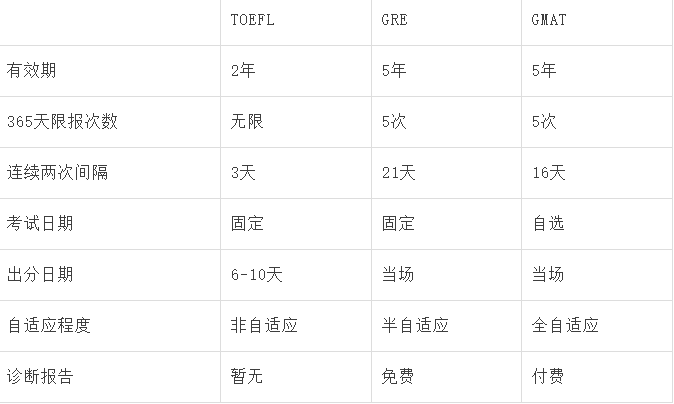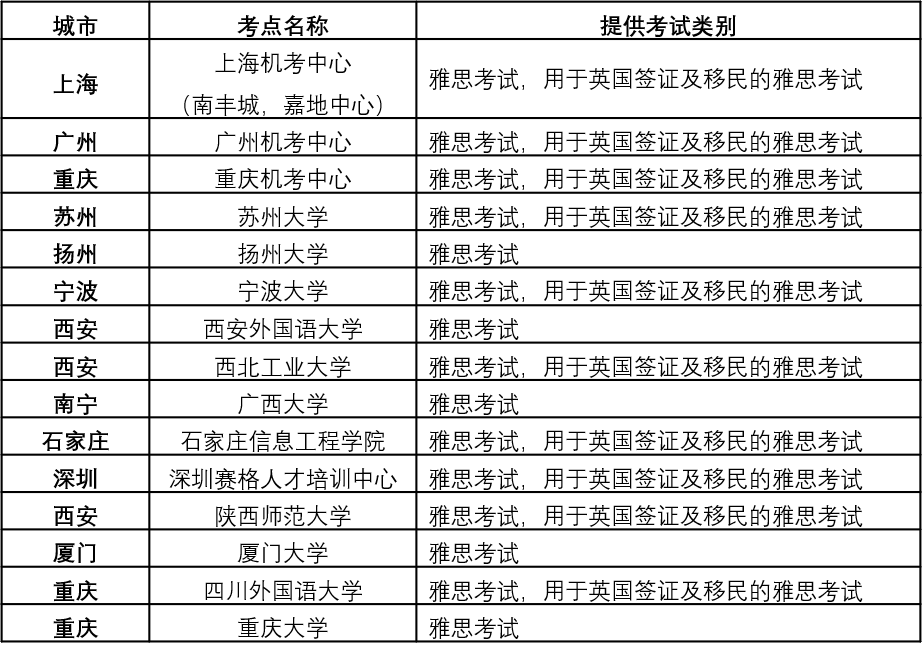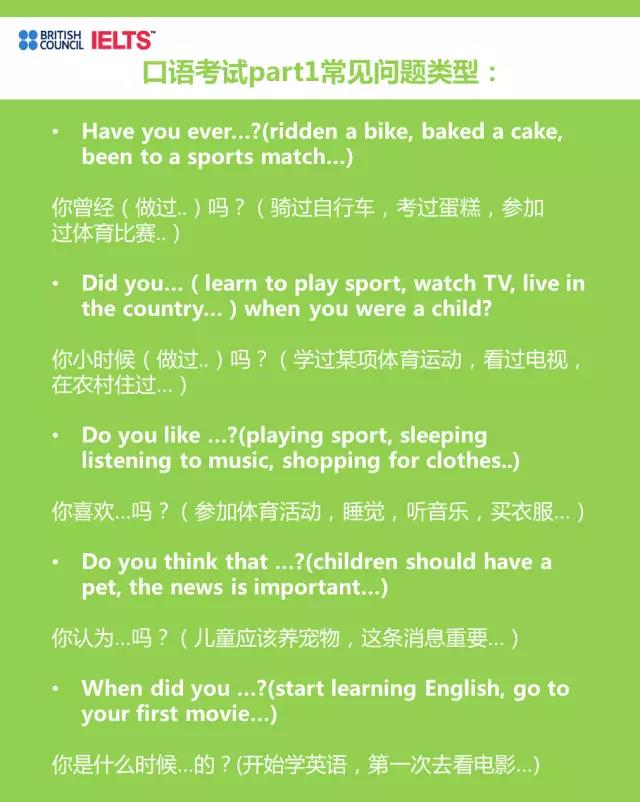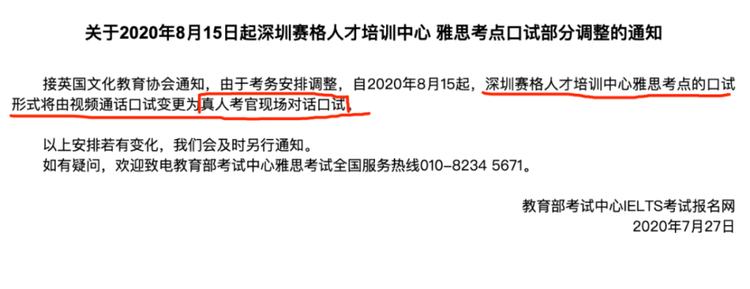托福口语不仅仅是托福词汇和句型的堆砌,同样,托福口语也讲究地道,在备考托福的过程中,你的托福口语如果添加一些美式俚语或者是美国常用日常语言,今天小编给大家带来了托福口语常用句型之问话类,希望能够帮助到大家,一起来学习吧。
托福口语常用句型之问话类
1. How are you doing?你好吗?
美国人见面时候最常用的打招呼方式就是, "Hey! How are you doing?" 或是 "How are you?" 不然 "How's going?" 也很常见. 我觉得这种每天跟别人打招呼的习惯, 就是跟美国友人建立良好关系的开始. 很多人都觉得美国人很冷漠, 不跟自己打招呼, 但自己又何尝不是对美国友人很冷漠呢? 关于更多打招呼之间的应对, 请参照笔记本专题篇.
2. What's up? 什么事?
"What's up?" 也是很常用的一种打招呼方式. 比方说 Bob 在路上看到我跟我说 "Hey! Kun-Lin!" 那我通常就会答说 "Hi! Bob. What's up?" 这就是问对方近来怎样, 有什么事吗? 通常如果没什么事人家就会说 "Not much." 不过还有一种情况也很常见, 你先跟人家说 "Hey! What's up?" 那别人也不说 "Not much", 反而反问一句, "What's up?" 所以 "What's up?" 已经变成有点 Hello! 的味道在里面了.
"What's up?" 也常被用来问人家有什么事? 例如有人登门拜访, 你就会说 "What's up?" 到底有何贵干啊? 总之 "What's up?" 在美国应用的很广, 各位一定要熟记才是.我有一个从南非来的朋友 David, 他对于我的笔记本提供了很多的帮忙和建议.他说在南非的打招呼方式是 "How zit?" 这是从 "How's it?" 衍生变化而来. 所以同样是讲英文的国家, 打招呼的方式也有很大的不同.
3. Could you do me a favor? 能不能帮我一个忙?
人是不能独自一个人活的, 需要别人帮忙的地方总是很多, 所以我就会常讲, "Could you do me a favor?" 或是 "Could you give me a hand?" 这算是比较正式而礼貌的讲法. 有时候要请别人帮忙还不太好意思说, 我就会说 Could you do me a little favor? 能不能帮我一个小忙? 其实也许是帮大忙但也要先讲成小忙, 先让对方点头才是. (注意一下这里用 could you 会比 can you 来的客气一点.)另外, "Can you help me?" 也很常见, 通常比如说我们去买东西, 可是店员自己在聊天, 我就会说, "Can you help me?" (其实正常来说, 应该是他们主动会问 "Can I help you?" 或是 "May I help you?" 才对, 但有时实在等不急了, 就直接先问了 "Can you help me?"
4. What are you studying? 你主修什么的?
通常老美一听我是学生, 都会很自然地问, "What are you studying?" 其实这样的问法就是问你 "What's your major?" 但他们比较喜欢说 "What are you studying?" 如果说你遇见一个人, 你也不确定他是不是学生, 我们通常会问, "What do you do for living?" 你是作什么工作的? 或是简单地问, "What do you do?" 一般不会说成 "What's your job?
5. Where are you going? 你要去哪啊?
通常走在路上遇到好朋友, 除了打招呼之外, 我都还会问 "Where are you going?" 虽然刚来美国时我只听得懂自己的问题, 却听不懂对方的回答, 但是我还是喜欢问. 原因无它, 听久了自然就会了. 另外老美也很喜欢用 heading 这个字来代替 going. 所以你也可以问 "Where are you heading?" 同样都是你上哪去的意思.
6. What's your favorite ice cream? 你最喜欢的冰淇淋是什么?
这句话通常是当我遇到陌生人时, 又想不到其它话题的时候会最先想到的一句话. 试想二个人如果有共同的兴趣和嗜好是不是就很容易成为好朋友呢? 所以我就常问人家, "What's your favorite movie? Who's your favorite movie star?" 总之 favorite 之后可以接任何你有兴趣的话题.
Favorite 这个字很好用, 如果这句话你不用 favorite 的话, 就会变成 "What kind of ice cream do you like the most?" 听来是不是很冗长? 还有一点值得一提, 比如我要回答, 我最喜欢香草冰淇淋, 再来是巧克力要怎么说? 那就是 "Vanilla is my favorite flavor and chocolate is my second favorite.
7. What color is your car? What's the color of your car? 你的车子是什么颜色.
个人觉得 What 后面接一个名词这样的问句好用的很, 可是不知道为什么刚来美国的人似乎对这样的问法都不太熟悉.同样的句子我就曾说过, "What kind of color does your car have?" 听来是没错, 但我跟你保证老美绝不会这样问的啦! 他们就是 "What color is your car?" 有时候就干脆只说 "What color?" 就完事了.
让我们再来练习几句, "What year is your car?" 问你的车是几年份的? "What area do you live?" 问你是住哪一区的. 同样的 How 后接一个形容词也很常用, 例如 "How big is your dog?" 你的狗有多大?
8. What's going on? 发生了什么事?
比如说你要用计算机, 可是不知为什么无法开机, 你就可以说. "Hey, What's going on?" 虽然这句就完全等于 "What happened?" 或是 "What's up with that?" 但是老美还是比较比喜欢说 "What's going on?" , 又比如人家问你说, "Why is our oven broken?" 你就可以推的一干二净地说. "I don't know what's going on." (我不知发生了什么事)
9. How come? 为什么? (怎么会这样?)
How come 的用法大部份就等于 why 但是它的用法没有像 why 那么广, 它通常是用在你觉得奇怪, 而问为什么的时候, 比如说有人早上一大早要去 supermarket 你就会问他. "How come?" 另外, 当别人问你一个问题, 而你不想回答时可以说 "How come?" 相当于, "Why do you ask that?" 也就是说 "It's none of your business! "虽然 how come 跟 why 的用法上差不多, 但二者的问法不同, 例如上句, "Why is our oven broken?" 换成 how come 的话, 要说成, "How come our oven is broken?" 注意一下, 这二句的 be 动词位置是不一样的.
10. You want to go to see a movie? 你要去看电影吗?
这样的句子看似不合文法, 但却是老美天天在用的句子.他们有时候要说一个问句, 就直接把肯定句的尾音提高就成了疑问句. 其实正确的说法应该是, "Do you want to go to see a movie?" 但可能是太冗长了点, 所以老美才会直接说 "You want to go to see a movie?"另外, 更口语的说法应该是 "You wanna go to see a movie?" 因为在口语中他们常会把 want to 省略成 wanna. 或是把 going to 省略成 gonna. 所以这句话也可以讲成 "Are you gonna see a movie?"
11. Anybody needs a fork?有没有人要叉子的啊?
以前老师都教说英文中的问句只有 W-H 问句. 其实不然, 我发觉还有很多种问句, 例如这个我自己称它是 anybody 问句.例如有一次我们出去玩, 一下车, 有一个老美就问说有没有人要去上卫生间, 我记得很清楚她是怎么说的, "Anybody has to pee?" 是不是简单易懂?也有很多的问句是用 Any 开头的, 例如 "Any volunteer?" 有没有志愿的啊? 或是 "Any luck today?" 今天运气好不好啊?
托福口语模板总结
Task 1
Personally, I would have to say that, um, the person that I admire most / a valuable possession I want to talk about / the place I would most like to go is ______________。
And there are a couple of reasons to name. The most important thing is that, you know, ____________________.What’s more, ____________________. So that’s why ____________________。
Task 2
Well, in my opinion, I would definitely agree with the point that, um, ____________________.The first reason that I wanna say is that____________________. More importantly, ____________________. So, uh, that’s why I choose ____________________ for the two reasons listed above。
Task 3
The school has implemented a new policy that________________due to ____________________。
And the man/woman holds a positive / negative view towards the announcement. The first reason s/he gives is that____________________. And the second one is based on the fact that____________________. Therefore, s/he agrees/disagrees with that opinion。
Task 4
In the lecture, the professor mainly talked about the theory that____________________。
To reinforce the theory, the professor gave two examples / reasons in his speech. The first one is that____________________. The other one is that____________________。
And that’s the two examples / reasons the speaker presented to explain his/her idea. (The conclusion is optional. )
Task 5
In this conversation, the man/woman is having a hard time dealing with the problem that ____________________. And the woman/man offers him/her two possible solutions. One is ____________________. The other is ____________________. And if it were my choice, I would choose the former/latter one, because____________________。
Task 6
In the lecture, the professor provides two examples to illustrate the phenomenon/theory that____________________. The first one is that____________________. Another example is that____________________. And that’s the two examples the speaker presented to explain the theory/phenomenon. (Still, the conclusion is optional. )
注:1.2題範本比較口語,比較自然。有些許的well,um,you know之類的詞,是可以理解的。
It‘s a good way for you to buy time to think. But remember not to use them too much。
托福口语常见的否定句有什么
否定句型:
1. There is not a moment to be lost. 分秒必争。
2. There is no holding back the wheel of history. 历史车轮不可阻挡。
3. Not a soul was anywhere visible. 到处见不到一个人。
4. I felt sorry for not coming in time. 我很抱歉没准时到。
5. I don’t think it is right to make such a hasty decision. 我认为如此仓促做决定是不正确的。
6. Everybody, it is true, wouldn’t like it. 的确并不是人人都喜欢它。
7. I don’t wholly agree. 我并不完全同意。
8. All my plans came to nothing. 我的一切计划都没实现。
9. I shall never do it, not under any circumstances. 我不会做那事的。
10. I’ll not do such a thing, not I. 我不会干这种事的,决不会。
11. I could not assent to, much less participate in such proceedings. 我对这种行为不能赞同,哪里还说得上参加。
12. I did not even see him, still less shake hands with him. 我看都没看见他,哪里还可能同他握手呢?
13. I never thought of it, let alone did I do it. 我想都没想到它,更谈不上去做了。
14. Little remains to be said. 简直没什么可说的了。
15. I have hardly ever been out of Beijing. 我几乎未曾离开过北京。
16.I saw little or nothing of him after you were gone. 你走后我很少看见他,几乎可说完全没见过他。
17. I could not help showing my pleasure. 我不禁喜形于色。
18. I cannot but admire his courage. 我不得不赞美他的勇气。
19. I never see you but I think of my brother. 我每次见到你就想起我的兄弟来。(我没有一次不是见到你就想起我的兄弟来。)
20. It simply will not do. 那是绝对不行的。
托福相关文章:
★ 学习资料库
★ SAT考题又重复 中国学生接下来该怎么办
★ 英语口语3000句第一课(1-94)
★ 2020托福听力5大出题规律是什么
★ 英语文摘
★ 中国合伙人观后感影评2020
★ 2020年bec中级适合什么人考
★ 如何能够更有效的背单词呢
★ 关于参评优秀学生申请书范文
★ 学习资料库
上一篇:托福口语常用句型之餐厅篇
下一篇:托福口语常用句型之购物类





